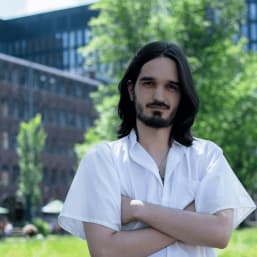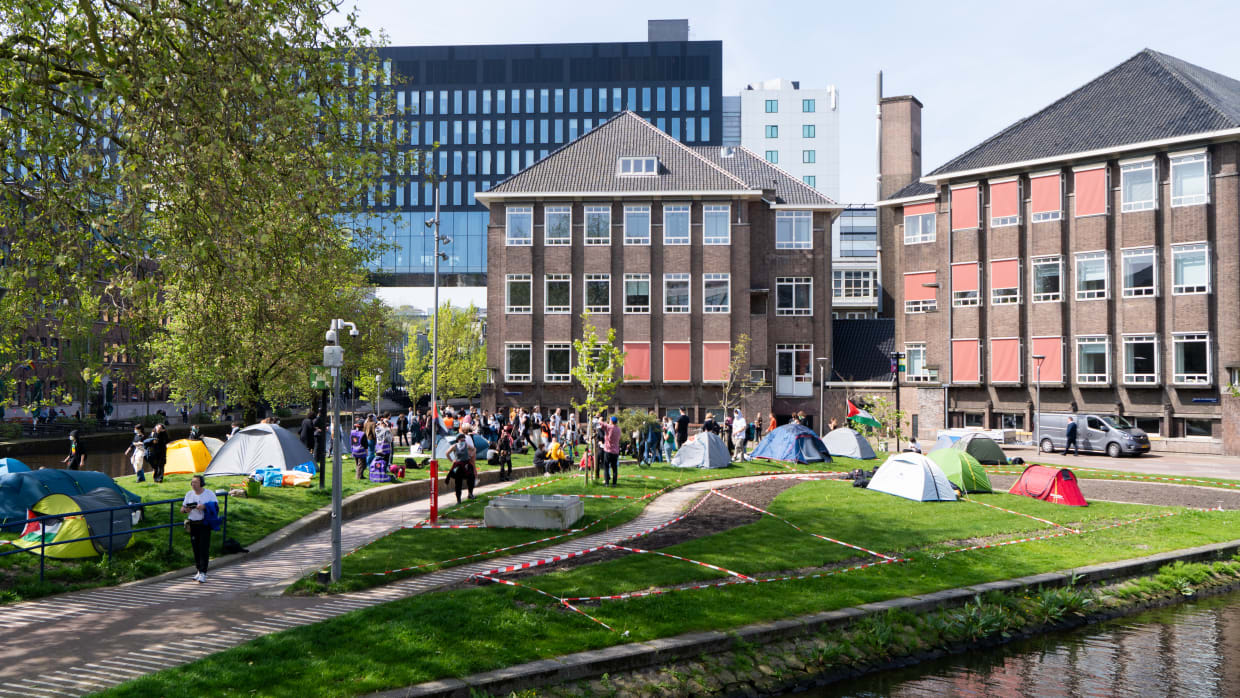
Palestine is a litmus test, and the UvA is deliberately failing it
One year after the start of the protests on Roeterseiland, master’s student Zep van de Visse calls on the Executive Board to show its human face. “Have some empathy. Violence against people solves nothing and only incites violence against objects.”
It is 11:00 a.m. on 6 May 2024. I am standing in an alley near Roeterseiland with about 50 fellow students, all armed with tents, sleeping bags and biscuits. Our intention: to camp out on a lawn. Singing, speeches, conversations with passers-by about ethics. Nothing big, nothing violent. Just keep talking and hope that people would be convinced that the university should stop giving money to Israel, a year before Israel announced last week that it intends to completely conquer Gaza and expel all Gazans from the country or the world.
I spoke to a few people, and it quickly became clear that everyone was prepared to come and camp in the sun. Sunscreen and bottles of water were in abundance, but plans for what to do if things went wrong were not. But what started as a sunny gathering on a lawn turned into a nightmare. Not because we wanted it to, but because the UvA let it happen.
Administrative escalation
Halfway through the afternoon, the then dean, Agneta Fischer, arrived. First, she asked what we needed to leave. Our answer was clear: end financial ties with Israeli institutions involved in the oppression of Palestinians. She disappeared again for an hour and returned with the message that we would be cleared. At that point, she did not even know that the field we were sitting on was municipal property, not university grounds. Nevertheless, the threat of police action soon followed.
The news that we would be evicted, which has always been accompanied by violence during student protests, caused unrest on the lawn. We prepared ourselves: not for violence, but to stand our ground. People among us with experience of the occupations of 2018 and 2023 came up with the idea of building a barricade. The UvA had sent violence against us, so we would make it as difficult as possible for them to chase us away and beat us up. We would be beaten and arrested anyway, so we might as well make sure that no one could be isolated from the demonstration and taken away.
What followed was a familiar scenario: first came the so-called ‘peace police’ – a smooth-talking ‘good cop’ vanguard of the riot police – with the message: leave voluntarily, or the ‘bad cops’ will come. We did not leave. Because we were in the right, because peaceful protest is not a crime.
Ten minutes later, our protest was attacked by members of Maccabi Netherlands, an extreme right-wing Israeli thug squad, without any intervention from the peace police or security. Was there any response to this from the Executive Board? No dialogue. No empathy. No leadership.
Femke Halsema
Leadership did come from Femke Halsema, who, after the Executive Board reported the incident, could not allow our protest to continue, but did offer us another option in negotiations, namely that if we left the lawn ourselves, the police would let us go. We chose not to accept that offer because we knew that if we gave up our only bargaining chip, nothing would happen, just as students in protest have not been listened to since 1969.
That night, the mask came off. The riot police, flown in from all over the country, began violently dragging students off the grass and beating them up. Meanwhile, there had been no negotiations whatsoever from the Executive Board, except for the early release of the results of a WOO request, which was already a week late.
And yet: half of Amsterdam was behind us. Food, first aid kits, keffiyehs and flares were brought in. People who feel oppressed support each other. Before the UvA announced that it would clear the square, it was a mix of supporters and opponents of breaking ties, staff from the Jewish Museum were talking to students in contact with Samidoun, right-wing students were talking to Frankfurt School philosophy lecturers, and even Machiel Keestra was sitting on a windowsill in the sun talking to a Palestinian student who was trying to convince him of a better diversity policy. Until the threat of eviction came, the camp was an exercise in democratic pluralism.
A few tents
It has now been a year and a thousand articles since a few tents were set up on Roeterseiland. A few tents on a field that does not even belong to the University of Amsterdam, with students wearing keffiyehs talking to bystanders about the genocide in Gaza. It would have remained that way if the University of Amsterdam board had not threatened to use force.
The current hardening of attitudes need not have happened. If the UvA had asked the ethics committee to break off relations with Hebrew University a year earlier, as was requested, there would not even have been any tents.
But the Board did not want to see that. They chose repression over dialogue. And why? Fear. Fear of The Hague, fear of budget cuts and fear of being labelled ‘woke’.
Over the past year, I have spoken to many people within the UvA, at various levels, including administrators. What they said was alarming: they feared that the government would punish us for taking a critical stance. They looked at Hungary and thought: this could happen here too. So they chose to trade ethics for a survival strategy. The report of the ethics committee on cooperation with Hebrew University was acknowledged but not followed up, and the advice in the Berenschot report on more empathy was clearly not taken into account a few weeks ago during the occupation of the Maagdenhuis on 14 April.
Be brave
It is time to stop the political game. Away with the façade that the university can remain apolitical while participating in politically motivated repression. It is time to stop adapting the university to anti-scientific authority and to be democratic in times of a crumbling democracy. Condemn and sever ties with institutions that are complicit in human rights violations. Be courageous, show what it means to recognise human rights.
Or better yet, truly democratise the university, something we students have been saying since the Maagdenhuis occupation of 1969. Listen to the student council, which weeks before May last year submitted an unsolicited recommendation to investigate and sever ties with Israel. Students and staff without real say will rise up again and again. Let the Executive Board function as a cabinet and the student council and works council as its House of Representatives and Senate. Risk democracy in an autocratising Europe.
Have a little empathy. Violence against people solves nothing and only incites violence against objects. If you do not want to be democratic as a university or university board, at least be human. Ethics and law are different, and the fact that you can use violence does not mean that you should. Talk to students instead of beating them up.
Zep van de Visse is a master's student in philosophy of social sciences and a board member of Asva Student Union.

